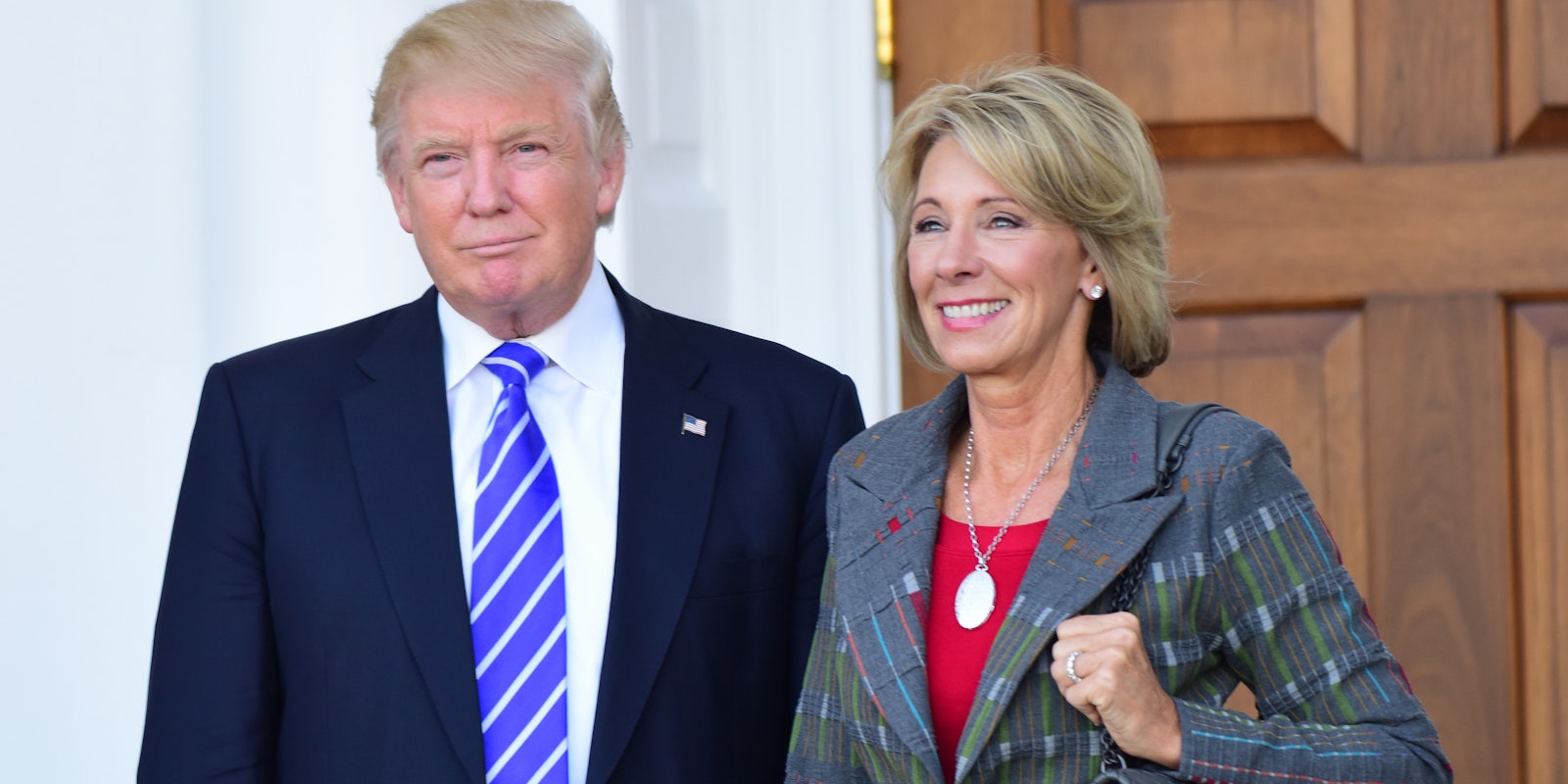Education Secretary Betsy DeVos issued a statement on Monday evening that praises a system created as a result of legal segregation as a success of “school choice” in America.
DeVos referred to the nation’s 105 historically black colleges and universities (HBCUs) as “real pioneers” when it came to “school choice,” a term for the voucher system that DeVos has pushed for throughout her career that critics say endangers funding to America’s K-12 public education system.
Inbox: @BetsyDeVosED statement on today’s meeting with HBCU leaders pic.twitter.com/J7SvKFjlcB
— adam harris (@AdamHSays) February 28, 2017
Both President Donald Trump and DeVos are advocates for school vouchers that allow students to use public education funds at their choice of private, charter, or public schools.
DeVos’ statement quickly drew the ire of many on social media due to the fact that she avoided making the uncomfortable conclusion that Jim Crow-era segregation laws led HBCUs to be created in the first place.
https://twitter.com/fivefifths/status/836571958347169792
“HBCUs are real pioneers when it comes to school choice,” said the Secretary of Education, without any shame or historical perspective. https://t.co/SKtNY7SiSh
— Jamil Smith جميل كريم (@JamilSmith) February 28, 2017
No, Sec. DeVos- the segregation and inequality that forced the establishment of HBCUs is not a model of “school choice.” https://t.co/CIotGpKzBH
— Senator Bob Casey (@SenBobCasey) February 28, 2017
Betsy DeVos said HBCUs were about school choice. As if white/colored water fountains were about beverage options. pic.twitter.com/I3tNlER43n
— Pièce de Résistance (@PieceDeReSister) February 28, 2017
https://twitter.com/fmanjoo/status/836576203716730880
A cursory look at U.S. history shows that the effort to end legal segregation turned American universities into literal battlegrounds for civil rights. The most memorable example came in 1962 when 20,000 U.S. troops and 10,000 federal marshals and national guardsmen had to protect the first black student admitted to the University of Mississippi.
DeVos and Trump on Monday met with leaders of HBCUs. Trump is expected to sign an executive order on Tuesday that the White House says will bolster HBCUs.
In a response to a question by AURN’s April Ryan, White House Press Secretary Sean Spicer on Monday did not specify how exactly Trump’s executive order would help the nation’s 105 HBCUs. Spicer instead seemed to imply that funding for HBCUs, which is currently spread throughout the federal government, should be unified in a “pipeline” to the White House.
“It’s one thing to have them … spread throughout the different departments, it’s another thing to make sure that there’s a direct pipeline to the president of the United States—that those programs are being executed in a way that’s benefiting the future of HBCUs and the various projects and teaching that goes on there,” said Spicer.
According to the Washington Post, the United Negro College Fund requested that Trump move the White House Initiative on Historically Black Colleges and Universities back to the White House, which Trump’s executive order is expected to do. The Initiative is currently at the Department of Education.
Howard University in Washington, D.C., will soon celebrate its 150th anniversary. The Washington Post noted that Howard’s federal appropriation dropped due to budget cuts from sequestration, from $234 million in 2012 to $221 million in 2013. The university is requesting the same amount—$221 million—from the federal government for fiscal 2017.
DeVos met with leaders of Howard University on Monday and is expected to give an address on HBCUs at the Library of Congress on Tuesday.
Thanks to @HUPrez17 & student leaders for the great discussion @HowardU today. Congrats on #HowardU150! pic.twitter.com/OfkP5w1nV9
— Betsy DeVos (@BetsyDeVos) February 9, 2017
Numerous students at Howard expressed concern about the education secretary’s visit, according to the Hilltop, Howard’s student newspaper.
Many critics of DeVos are angered by the fact that she has remained silent on the unintended impact that charter schools have had on further segregating schools.
A UCLA study that analyzed the demographics of charter schools across 40 states and the District of Columbia noted that charter schools were more racially isolated than public schools.
“While segregation for blacks among all public schools has been increasing for nearly two decades, black students in charter schools are far more likely than their traditional public school counterparts to be educated in intensely segregated settings,” the study found. “At the national level, 70 percent of black charter school students attend intensely segregated minority charter schools (which enroll 90-100 percent of students from under-represented minority backgrounds), or twice as many as the share of intensely segregated black students in traditional public schools.”


